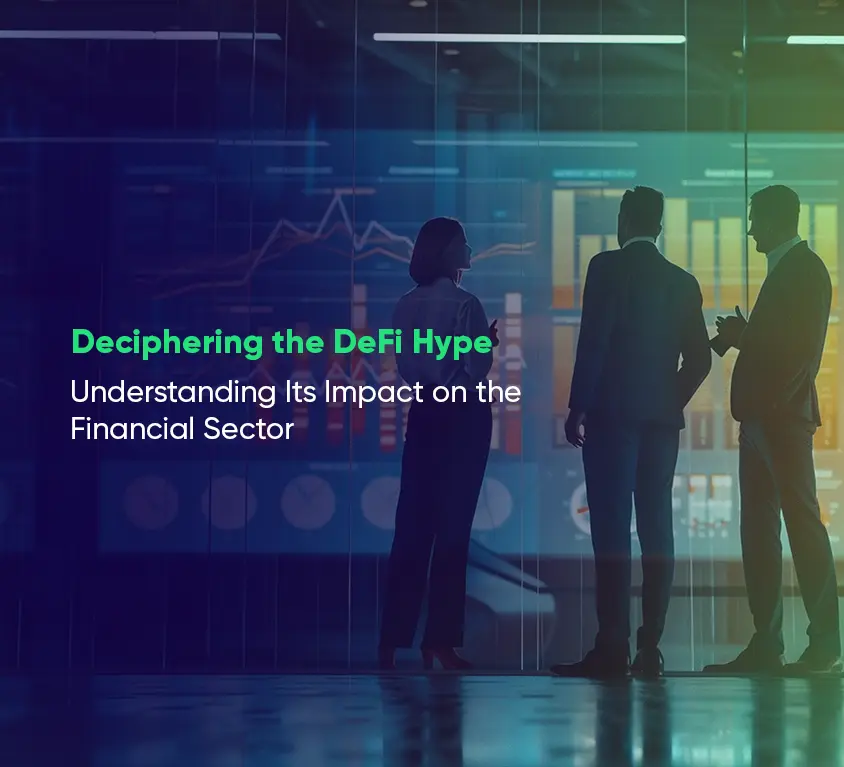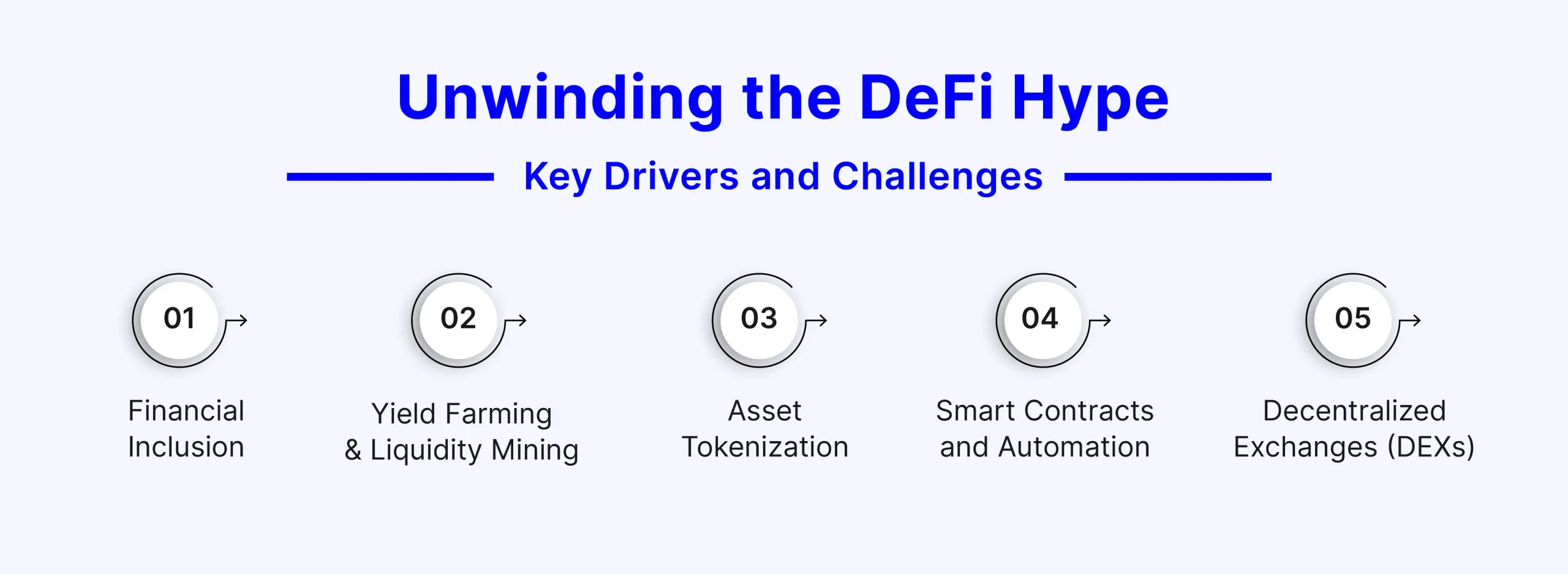
Introduction
Web3 & Blockchain Consultancy :
Deciphering the DeFi Hype: Understanding Its Impact on the Financial Sector
A quiet revolution has been stirring in the domain of finance over the past few years, one that challenges the foundational mechanisms of traditional banking and investments. This revolution is supported by Decentralized Finance, commonly known as DeFi. Born from the blockchain technology that brought us cryptocurrencies, DeFi represents a radical shift towards a system where financial products are available on a public decentralized blockchain network, making them open to anyone to use, rather than going through middlemen like banks or brokers. The DeFi hype in these past years has captured significant attention not only from crypto followers but also from traditional financial institutions that are beginning to recognize its potential to change the landscape of the financial sector.Key Takeaways
- DeFi Finance: The DeFi hype rightly points to a transformative shift in financial services, offering more autonomy and potential earnings. However, participants should navigate this space with an informed, cautious approach.
- Decentralized Finance vs. Banks: Decentralized finance offers a compelling alternative to traditional banking by eliminating intermediaries, reducing fees, and providing 24/7 access to financial services globally.
- Challenges of DeFi: DeFi comes with significant challenges such as smart contract vulnerabilities, regulatory uncertainty, and the need for more sophisticated security measures to protect users’ investments.
- Future Aspects: The future of DeFi likely involves greater integration with traditional financial systems and increased regulatory frameworks, which could help stabilize the market and enhance user trust while fostering continuous innovation in the sector.
Understanding DeFi
Decentralized Finance (DeFi) challenges traditional finance by using blockchain technology and smart contracts to build a direct, permission-free financial system. This system runs on a clear, unchangeable record that logs every transaction, and it uses automated agreements to handle financial transactions without middlemen. This big change gives people more control over their financial dealings and opens up more opportunities that were previously limited by central institutions.Unique Features that Differentiate DeFi
Decentralization
DeFi breaks down the traditional finance hierarchy. No single group controls the rules, access, or holds onto user funds. This creates a strong, censorship-resistant system where users truly own and control the financial tools they use.Transparency
All DeFi transactions are recorded permanently on the blockchain, visible to everyone. This openness builds trust and accountability, removing the secrecy that often exists in traditional finance. Every activity, like giving out loans or swapping assets, is completely open for anyone to check and verify.Interoperability
DeFi breaks down the barriers of traditional finance, allowing different programs and protocols to work together smoothly. This connectivity opens up a wide range of financial tools and opportunities, making it easier for users to manage and grow their finances in this dynamic environment.Inclusivity
DeFi makes financial services available to more people than traditional finance does. Anyone with an internet connection, including people who don’t have bank accounts, live in remote areas, or have been left out before, can now use important financial services, manage their money, and explore new financial possibilities. This makes finance more democratic and gives people more control over their financial health. Together, these features create a growing ecosystem where users can lend out their cryptocurrency to earn interest, access diverse lending pools at potentially lower costs, trade assets easily, and try out new investment options that weren’t available through traditional methods. At its core, DeFi challenges the centralized nature of traditional finance. The old gatekeepers like banks and brokers are gone, replaced by a system where people deal directly with each other, supported by blockchain technology. Imagine it as a digital marketplace where anyone with an internet connection can access financial tools and opportunities.Unwinding the DeFi Hype: Key Drivers and Challenges
DeFi, or Decentralized Finance, has undeniable potential, but the excitement around it is based on several important reasons. Let’s explore some key ones:
Financial Inclusion
Many people find traditional financial systems too difficult to use due to barriers like location, the need for initial money, and complicated credit checks. DeFi finance changes this by being open and not requiring permission, which means it removes these barriers. It allows people who don’t have bank accounts or who have been underserved by banks to use services like loans, savings, and investing, giving them more control over their money. For example, consider Maria, a farmer in rural Kenya, who uses a DeFi platform to get small loans for seeds and fertilizer, helping her grow more crops and earn more money. This is just one-way DeFi helps include more people financially and opens up new opportunities for those often left out.Yield Farming and Liquidity Mining
Although these might seem like complex concepts, they are vital for drawing people to decentralized finance. Yield farming rewards users for adding their cryptocurrency to a pool with returns, while liquidity mining offers extra tokens for those who help a platform grow and stabilize early on. However, these methods can be risky. The value of tokens can change a lot, and dealing with complicated smart contracts might lead to unexpected losses.Asset Tokenization
Imagine owning part of a famous painting or some real estate, all handled smoothly on the blockchain. Asset tokenization makes this possible by turning real assets into digital tokens. This opens new ways for investing and shared ownership. This could shake up traditional markets by making it easier to buy and sell assets and allowing more people to invest in things like art or real estate that were hard to get into before.Smart Contracts and Automation
Forget about all the paperwork and slow processes. DeFi smart contracts automate financial tasks. They handle everything from paying back loans to figuring out interest without needing middlemen, which cuts costs and improves efficiency. For instance, Sarah can get a DeFi loan automatically, without ever talking to a bank. The smart contract uses her assets as security and manages the loan terms on its own, simplifying the process and removing the chance for mistakes.Decentralized Exchanges (DEXs)
While centralized exchanges have long been the main way to trade cryptocurrencies, DEXs offer a different approach. These platforms let users trade directly with each other without a central authority, increasing security, reducing censorship, and often lowering fees. DEXs like Uniswap and SushiSwap are becoming more popular because they let users control their money and trade freely. They show what the future of finance might look like, where DeFi operates independently from centralized systems.Exploring the True Impact of “DeFi Hype vs. Reality” Debate
Decentralized Finance (DeFi) has sparked a lot of excitement in the world of finance. It promises easy access for everyone, high returns, and new financial tools, quickly becoming a hot topic. Yet, amid all the excitement, an important question arises: Can the DeFi hype last over time? To find out, we need to look closely at both the exciting prospects and the real challenges of this innovative technology.Is DeFi Sustainable? Understanding the Benefits and Drawbacks
DeFi is appealing because of its core features, which include:- Accessibility: People without bank accounts and anyone with an internet connection can use financial services that were once out of reach.
- Higher Yields: DeFi often offers much better returns than traditional financial options, attracting investors looking for big gains.
- Programmable Money: Smart contracts make it possible to create new financial tools and automate complex transactions, making things more efficient and flexible.
- Challenges and Risks in DeFi
Volatility
The crypto market can be unpredictable, with sharp ups and downs. This makes DeFi investments quite risky.Security Risks
DeFi platforms and smart contracts can be vulnerable to attacks and security breaches. There have been several major incidents where a lot of money was lost, underscoring the importance of strong security and careful user behavior.Regulatory Challenges
As regulations keep evolving, DeFi projects face uncertainty and potential obstacles, which can affect how widely they are adopted. Understanding these points helps us see both the potential and the limitations of DeFi, moving beyond the initial hype to grasp the lasting impact it might have on finance.Navigating the DeFi Domain
For anyone entering the world of DeFi finance, careful planning is essential. It’s important to research well, understand the protocols you’re using, be aware of the risks associated with smart contracts, and stay prepared for market fluctuations. Choosing well-known platforms, using secure wallets for your assets, and spreading your investments are key steps in managing these risks. Keeping an eye on industry updates and being alert to potential scams is also crucial for safely navigating this changing environment.Getting Started in DeFi
- Basic Knowledge: Dive into the basics of DeFi such as tokens, protocols, and risks. Use resources like academic articles, industry reports, and expert-led webinars to learn.
- Choosing Platforms: Pick DeFi platforms (like DEXs or lending protocols) that suit your risk level and goals. Consider their security history, overall reputation, and how much liquidity they have.
- Managing Wallets: Choose a non-custodial wallet (like MetaMask or Ledger) for control, or a custodial one (like Coinbase or Gemini) for ease of use. Always keep your private keys secure.
- Starting Small: Begin with safer, smaller activities like lending stablecoins or joining well-known liquidity pools. Gain more experience and confidence before trying out more complex strategies.
- Joining Communities: Participate in DeFi forums, Telegram groups, and Discord servers to connect with experienced users and gain useful insights.
Taking Precautions
- Do Your Homework: Always do thorough research. Check how protocols work, examine smart contract codes, and identify any vulnerabilities. Look for audits and feedback from the community.
- Diversify Your Portfolio: Spread your investments across different protocols and types of assets to reduce risk. Avoid putting too much into any single DeFi project.
- Watch Out for Scams: Stay alert to scams like rug pulls. Stick to well-known blockchain platforms and prefer projects with strong community support and clear transparency.
- Maintain Strong Security: Use good security practices such as strong passwords, two-factor authentication, and careful interactions with dApps to protect your assets.
- Understand Regulations: Keep up with changes in regulations that could affect DeFi activities. Adjust your strategies to stay compliant with legal requirements.
Looking Forward: The Changing World of DeFi
As DeFi continues to evolve, let’s explore the emerging trends and transformative potential that are reshaping the financial landscape.- Institutional Participation: More banks and financial companies getting involved could make the DeFi system more stable and rich with options.
- Practical Applications: Merging DeFi with new technologies like AI and IoT could lead to new uses in managing assets, personal finance, and small loans.
- Linking Different Blockchains: Building secure connections between various blockchains can create a more unified and varied DeFi world, giving users more options and better features.
- Expanding Beyond Ethereum: DeFi activities are likely to spread to other big blockchains like Solana, Polkadot, and Binance Smart Chain, making the environment richer and more connected.
- Merging with Traditional Finance: There could be a future where traditional finance and DeFi blend, allowing people to borrow using real-world assets like houses or cars, mixing the old and new ways of finance.
- AI-Driven Improvements: Smarter algorithms might tailor DeFi services to individual needs, improve investment choices, and handle complex operations automatically, making things easier and more effective for users.
- Private and Secure Identities: Blockchain-based personal ID solutions could change how we access financial services, increasing privacy and personal control.